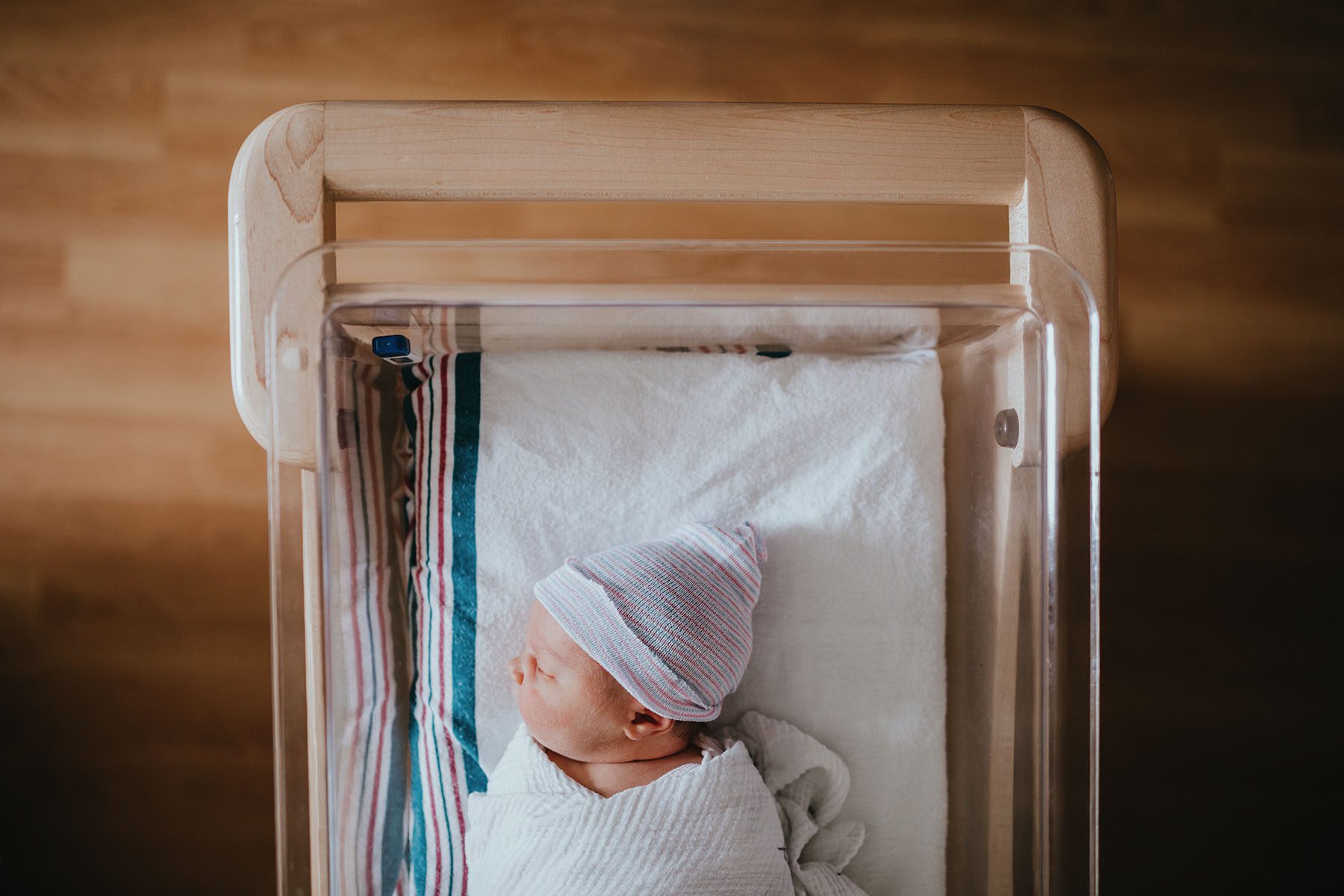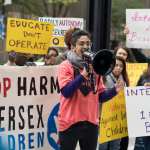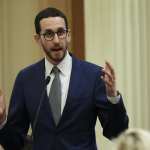Austin, Texas, became one of the few cities in the United States last week to formally condemn medically unnecessary surgeries on intersex children. While the city’s resolution has no authority to ban surgeries, advocates hope the effort will educate parents and send a message to doctors that they should stop the practice.
“Activists have been saying the same thing for years,” said Sean Saifa Wall, co-founder of the Intersex Justice Project. “Leave us alone, leave our bodies alone, let us have autonomy over our own bodies.”
Austin’s resolution came a few days before Intersex Awareness Day, which is October 26 and is expected be observed by a White House listening session with advocates, interACT executive director Kimberly Zieselman said over email. The group lobbies on behalf of children who are intersex — born with differences in reproductive anatomy or sex traits.
Advocates, who see awareness and education about what intersex people face as a crucial part of the fight, celebrated the decision and say more direct action is needed — especially as the community faces widespread inequity.
Intersex advocates and parents of intersex kids tell The 19th that lasting physical and mental trauma can stem from the surgeries, which are largely performed for cosmetic reasons and only medically necessary in a few situations — like creating an absent urinary opening or removing malignant tissue. Consequences of unnecessary surgeries include pain, incontinence and infertility, per the United Nations.
Roughly 1 in 2,000 babies demonstrate enough physical differences to cause doctors to recommend surgery, whether or not intervention is needed, the interACT and the Human Rights Watch found in a 2017 study based on data collected from several countries. It is just the beginning of a fraught relationship many of these people have with the health care system.
Eighty-eight percent of LGBTQ+ intersex people polled by the Center for American Progress in June 2020 said they were discriminated against by a doctor or health care provider in the last year, including physical abuse and refusal of care. It’s estimated that 1.7 percent of people are born intersex, although a true number of intersex people in the U.S. is difficult to estimate because of serious data limitations, said Caroline Medina, policy analyst for the center.
-
More from The 19th
- Biden White House holds largest meeting with intersex advocates
And about 60 percent of intersex LGBTQ+ respondents told the center that they avoid doctors’ offices to avoid discrimination — a fear echoed by one parent who told The 19th that she doesn’t want her intersex child to not trust the medical system, even after negative experiences.
Kristina Turner, who lives in Washington state and volunteers on the board of interACT, said that doctors at Seattle Children’s Hospital first suggested feminizing surgeries for her child in 2007, when Ori was around eight to 10 weeks old — shortly after she knew Ori was intersex.
Turner felt like the doctors were putting her child under a microscope and were trying to pressure her into doing something that didn’t feel right.
“I would try to say, I don’t want a lot of people in here, and they would have like 10 students and doctors in there,” Turner said. “There was also a moment when they were examining Ori, where they all literally shoved me aside so that they could surround my baby.”
Turner reflected that her privilege as a White parent was probably one reason why the doctors did not more forcefully try to convince her to consent to putting her infant through a gonadectomy and clitorectomy. While gonadectomies can be recommended in some cases to remove malignant germ cell tumors, tumor risk before puberty is very low. For intersex newborns, reducing the size of the clitoris or totally removing it is usally just cosmetic.
I kept asking my doctors to let me talk to someone, and there was just silence.
Arlene Baratz, who has two adult intersex daughters
There is no nationwide dataset on how often surgeries like these are performed on intersex children, and hospitals tend to poorly track what data they have, advocates say. Anecdotal stories from families are a key source of information to fill the knowledge gap.
Wall recalled two recent examples of mothers who directly contacted him through the Intersex Justice Project to share their experiences.
A Latinx woman in her early 20s living in New Jersey, who spoke with Wall in 2020, told him that physicians threatened to call child protective services when she resisted their recommendations to meet with a urologist for potential surgeries.
Another mother, a Black woman living in Georgia who spoke with Wall in 2019, told Wall that the nurses chided her after she refused surgery for her child immediately following birth. Wall could not recall what specific surgeries had been recommended for the infant.
“We don’t know the frequency of how often these surgeries are happening,” he said. “I know that they’re happening because parents are reaching out to me.”
Medical interventions on children with intersex variations were not commonplace in the United States until the 1960s. Last year, a Chicago children’s hospital became the first one in the country to stop performing unnecessary surgeries, after three years of protest by the Intersex Justice Project and other groups. Boston Children’s Hospital soon followed.
The American Academy of Family Physicians opposes unnecessary surgeries, and the North American Society for Pediatric and Adolescent Gynecology says that ideally surgery should be delayed until kids can be involved in the decision and express their gender identity. The influential American Medical Association has not issued a similar policy, after its student association pushed for it in 2017.
Kyle Knight, a senior Human Rights Watch researcher who worked on the 2017 study, said that while interviewing intersex people and their parents for the report over about six months, he had nightmares for the first time in his career.
The nightmares were “about living in a universe where all of the people that you trusted, your parents, your doctors, were lying to you,” he said. That lie was based on interviews where people described being subjected to surgery as children under the pretense that it was necessary — when it really wasn’t.
The current debate between advocates and parts of the medical community over whether and when physicians should perform surgeries on intersex children has been carrying on since the early 1990s, Knight said.
“The difference is, now this debate is not happening behind the paywall of an academic journal. It’s happening out in public,” he said.
That’s why Knight sees the resolution in Austin, Texas, and the other one like it passed in New York City this year, as victories — although they’re not binding.
Alicia Roth Weigel, a member of Austin’s Human Rights Commission, has been pushing for a resolution like the one passed last week since she came out as intersex in front of the Texas Senate in 2017, she told The 19th.
“The overarching message is ‘delay is okay’. And you should be waiting to make these decisions until the child is old enough to have consent and have a say in that conversation,” she said.
In New York, which condemned unnecessary surgeries in May, Weigel sees a hopeful sign: New York City’s public hospital system released interim guidance this spring that recommended unnecessary surgery on intersex children be delayed until the child is old enough to consent, per a copy viewed by The 19th. That guidance applies to 70 facilities across the city and was issued as providers wait for the American Academy of Pediatrics to weigh in.
Weigel hopes the resolution passed in the city last week will signal to Texas hospitals and doctors to reevaluate their practices.
Those practices and how the medical community treats intersex people can often be boiled down to how our society prioritizes traditional gender norms, several advocates said.
“I think when you have that kind of view of things, it’s natural to want to correct traits that are seen as abnormal,” said Arlene Baratz, a retired breast radiologist who has two adult intersex daughters.
“There are still ideas in the medical community of gender as something that’s binary,” she said. “And, unfortunately, those views get communicated to parents.”
Baratz, who has been advocating on behalf of intersex people for over 20 years and lives in Pittsburgh, said she has seen significant progress in education and awareness in this fight.
“I can see that we’ve come a very long way,” she said. “When my kids were diagnosed in 1990, the Internet didn’t even exist. It was very, very isolating. There really was no one to talk to. I kept asking my doctors to let me talk to someone, and there was just silence.”
Several advocates described the importance of community as an important step toward justice for intersex people, since many parents find themselves prompted to green-light surgeries for their children without any prior knowledge of what they should do.
Meg Robertson, who volunteers with the advocacy group InterConnect and lives in Massachusetts, adopted her 20-year-old, Banti Jaswal, when they were a toddler.
“Before we adopted them, they had had genital surgery done,” she said. “And that surgery was done when they were just a baby, like a year old.”
Educating parents is a crucial part of advocating for intersex people, she said.
“Many of the parents that come to our support group come traumatized because their birth experience was one where their child was taken away from them,” she said. “They don’t have a family history of intersex variations, they have no idea that this is even possible.”
Ori Turner, who is 14, has mostly found community with other intersex people online, especially during the pandemic.
They said that when they can, hanging out with their intersex friends and trans friends is one way that they’ve found joy and explored their gender identity. They’ve especially found solace with trans people, saying: “There’s more people that are out and proud of being trans.”








